#shakespeare analysis
Text
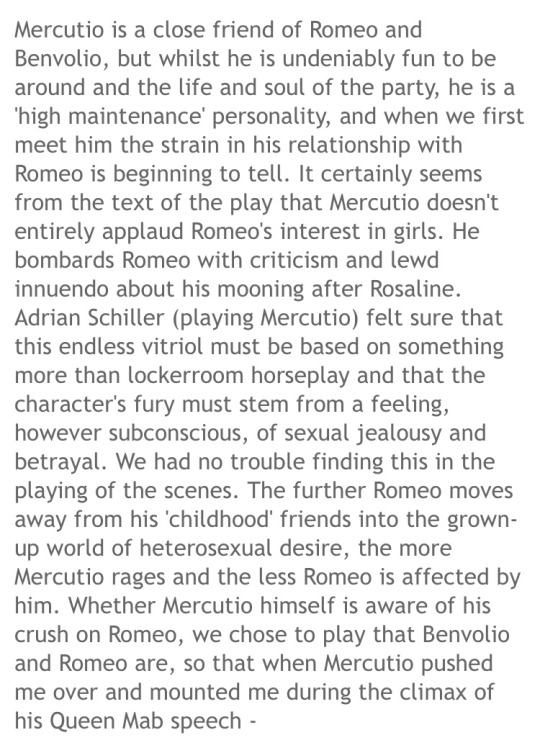
Loosing my mind over this…
#romeo and juliet#romeo montague#mercutio x Romeo#Mercutio#Shakespeare#shakespeare analysis#literature analysis#david tennant#Rsc#shakespeare plays
117 notes
·
View notes
Text
It is time, friends, for another Pip's Weed Essay game. The rules: I'm about to take an edible and start writing a mini-essay in one sitting. I edit a tiny bit as I go, but for the most part this is on the fly. I've thought about this topic a lot, but haven't outlined it. I'll let you know when the edible hits, but there's a chance you'll realize it before I do.
(PIRATE FRIENDS STICK AROUND - this is Pip from the future, I get pretty high in this, but anyway I'm here to tell you that this goes in a very unintended OFMD direction that i'm still reeling from. Anyway back to Past Pip)
Edible ingestion commencing, time: 7:37pm Mountain Time
I polled my followers for the topic, so today we're going to talk about:
Fixing the Puck Problem
I've read and seen A Midsummer Night's Dream more than any other Shakespeare play. At this point I don't know if I've seen it so much because it's my favorite, or enough opportunities for me to see it have lined up that it's become my favorite by default. It's easily the Shakespeare play I know best. I haven't seen a staging that I fully disliked, but there are two elements of this show that I feel like are rarely handled the way I want them to be.
Problem one:
Puck will never be as funny as Bottom
It's common to consider Puck to be the main character of A Midsummer Night's Dream. He's at the very least the most famous character in the play. Puck is a dream role, and obviously with his being a fairy, he's usually directed to be weird and whimsical--and a lot of the time, playing for laughs. It makes sense, he's a trickster, it's built into his nature.
But in modern day, his lines and actions don't translate as well as Bottom's. In all of the times that I've seen A Midsummer Night's Dream, I've *never* seen a production where Bottom fails to steal the entire show away from Puck. I've had multiple experiences where I could feel the director wanting me to laugh at Puck; I could see the reasons for the direction, but it just wouldn't hit. In those same productions, I've laughed so hard at the Bottom scenes that I cried.
I'm thinking particularly of the 2010 production with Judy Dench reprising Titania (honestly still in shock over seeing that lolol) and the 2019 Bridge Theatre production (which you can find streaming, it's *incredible*).
In the 2010 show, the Puck actor kept doing what honestly felt like a Woody the Woodpecker impression lol. He would pause for laughs and they just...wouldn't happen. Meanwhile, Bottom was set up with the kind of success that let him steal at least one scene from fucking Judy Dench.
In the 2019 Bridge Theatre production, I genuinely like the direction they gave Puck--he's a weird little twitchy Irish punk doing fucking aerial silk shit. But even with a unique vibe and a fun performance, it's still not enough to outshine Bottom.
Basically my thing is that I want to get to the end of A Midsummer Night's Dream and feel more connected to Puck. I *want* him to be my favorite. And there's just absolutely no way to make him my favorite if his core purpose is to be funny. Puck is supposed to be a larger-than-life being--the audience is never going to buy that when he's not even the largest character on the stage.
The second problem is smaller, and in fixing it there's also a fun chance to fix the Puck problem:
Problem two:
The audience usually doesn't understand why Titania and Oberon are fighting.
If you've gotten this far you're probably already a nerd who knows this, but gonna pose the question like I've done for other people I've seen the show with: Why are Titania and Oberon fighting? What's the core reason?
Bc you're a fucking nerd you probably yelled CHANGELING! Which yes, good for you, if I had become the Shakespeare professor I wanted to be but didn't have the money to become, you would be in my class and I would throw a snickers at you for a reward.
But the thing is, a *lot* of people who only know the play casually don't know. And most productions don't assist them in knowing.
Elaboration for non-nerds: Titania had a "and they were roommates" totally not at all lesbian relationship with a human women who was pregnant. The women dies in childbirth and Titania takes the child to raise, and she cherishes him more than anything, which is an extremely straight thing to do. In the play, the character is only referred to as the changeling. Oberon gets super jealous of this kid and wants to steal him away and make him join the Wild Hunt so that he can have Titania's full attention back, because he's got that issue creepy men get when they have kids and then are like "I'm jealous of my son because he's making it less likely for me to fuck my wife" and it's like "dude calm down with this projection of an Oedipal complex."
If you're not a coward and read Titania as in love with the changeling's mom, then Oberon's issues are maybe slightly less creepy, but like not really
So that's it really. Titania loves this kid of her sapphic lover that died. Oberon is jealous about it. He decides to play a trick on Titania both as a way to get revenge, and also as a distraction so he can steal the kid.
But the issue is that 1.) all of this is communicated in a long and kind of boring speech, and 2.) the changeling literally never has a line and also no stage directions
The 2010 production had a hot dude chained up and writhing on stage in a kind of hot dance snake movement thing when Titania talks about him, but most productions never even have an actor cast as the changeling. I was really shocked they didn't have anyone for the 2019 production, given how much I love most of the rest of their choices.
OKAY SO. We now have the two problems: Puck isn't the fan favorite even though he should be; and most people in the audience have no fucking idea about the changeling.
(THIS IS HIGH PIP FROM THE FUTURE I FORGOT SOMETHING VERY IMPORTANT TO THIS PROBLEM: If you do know about the changeling/follow along with that plot, it's *very* hard to root for Titania and Oberon when they reconcile. Which can be fun and cool and a little hot even maybe if you're going all dark, but thIS IS A PLAY ABOUT HORNY FAERIES HAVING A GOOD TIME so I won't be having that. I want this play to make me like that Titania forgives Oberon so easily. Okay Past Pip, take it away)
lol okay yeah weed friend has landed, I just wandered away for a minute with a desperate need to put taquitos in the air fryer. Time stamp: 8:16.
OKAY FOR REAL NOW LET'S GET INTO:
Pip's Most Ideal Staging of A Midsummer Night's Dream Which Fixes the Problems in Theory
The Staging:
First off I want the production to be in the middle of the literal woods where there's pretty lights in all the trees and people are sitting on blankets and have snacks and drinks and drugs and whatever they want, and the whole staging has the actors weaving through the audience. Not just theatre in the round, full immersion
I also want people to not fully know where the production is, just that it's on the outskirts of the forest, and then the actors emerge from the woods at a designated time and bring the audience to the secret stage section. And ideally this would be like a park on the outskirts of woods so that there would also be people there who wouldn't know what the fuck was going on. And ideally some of the fairy actors convince them to come along and the people go having no idea what they're about to get into. That's how A Midsummer Night's Dream is meant to be experienced in its purest form: with actors dressed as fairies trying to seduce unsuspecting strangers to follow them into the woods to an unknown location where they'll probably be offered drugs.
TAQUITO TIME
Taquitos acquired.
Puck's direction and motivation:
When Puck is first introduced, it's by a fairy called Peasblossom who's otherwise not a big part. Peasblossom lets the audience know who Puck/Robin Goodfellow is by basically going stan-mode and being like "holy shit you're famous." PB literally starts listing his greatest hits.
So picture with me: instead of an extremely fairy-like whimsical Puck, I want a Puck that wanders on-stage like a burnt-out rockstar. Cigarette in one hand, beer in another. Probably on a cocktail for faerie super magic mushrooms. Just fully numbed out. In this moment, Puck feels way more human than faerie--and I want the performance to be in a way where that feels off. To have it be communicated in manner and clothing, and the juxtaposition of PB recounting Puck's glory days, that Puck hasn't always been like this. This isn't a faerie trickster in his prime. This is a man who's lost all sense of fun and is going through the motions.
That's what happens, right, when you become just a little too famous?
Puck is the only one of the main characters who gets to the end of the show and is entirely alone.
(my favorite thing about being high is how *good* it makes food taste, these taquitos are not fancy but with the power of the devil's lettuce it's so good--oh my god I have Dr. Pepper)
(I'm back with the Dr. Pepper. I'm having fun, are you guys having fun? If you've made it this far i kiss u)
So Puck is alone at the end of the play while everyone else of import is either with their lover or with their theatre-kid-found-family. And it's largely because Puck lives between worlds. He's not powerful enough to be fey royalty; he's Oberon's right-hand man, but he's not Oberon's peer. But the lower fey court are also not his peers -- they treat him like a celebrity, he can't actually connect with them. He's not allowed to frolic and play with them anymore, not really.
With this interpretation and direction, we now have a Puck whose action in the plot can lead to a happy ending (keep with me), and whose existence isn't just to be quirky and whimsical for the audience. Instead it's a Puck with a motivation: he's lost all joy in his job, he's disconnected from him community, and Oberon only treats him like a fuckbuddy so he's sexually frustrated. (Oh right yeah I was supposed to write about how Puck is in love with Oberon. He is.) That's all fucking sad, bro! And you know from the Pip that traveled into the past that this play is fun and should be fun!
Now for the final part, where we put in the special ingredient to tie this particular Puck direction into the happy ending:
LET'S 👏 GET 👏 GAY 👏
Do you guys (gn) remember the changeling? It was like possibly an hour ago, the time-warp this particular edible always sets me on has fully set in. It's possible this essay is like 5k words long. It's also possible it's only 500 words long. I wish I was lying when I told you I don't know.
Anyway, the changeling. Let's make him a fuller character and let's give him to Puck wrapped up in a sexy, charming bow.
Picture this: The Changeling, from now on capitalized as a character, shown on stage in Titania's court. Locked up like a princess in a tower because Titania is desperate to protect him. And the Changeling is all *sigh and flutter big beautiful princess man eyes* because he wants to explore what's out there. Because he's a man who's grown up and been forced to live between two worlds. He's not fey royalty, he's not Titania's actual kid and she kind of honestly treats him more like a momento of her lesbian lover than an actual adopted kid. He can't be one of the fey court, because he's not fey, and also he's not allowed to frolic and play with them.
That should sound familiar to you if I did it right.
Puck and the Changeling, both feeling the same sort of empty spot. So let's smush them together.
Give the Changeling all of Peasblossom's lines. It makes more sense for a detail I left out before, too--Peasblossom doesn't recognize Puck they see him for the first few lines. Once they do they're all like "omg you're the dude that makes people horny for each other and also some other trickster things." They know all of Puck's stunts, but they don't know what he looks like? It's clearly an exposition device, but it's a weak one (sorry, Shakesy). He's the rockstar of the fey world. You'd have to be living under a rock or, I dunno, locked away like a beautiful man-princess --
(Okay you know where I'm going and I have to stop there because I'm cry laughing, I swear to you -- I swear to fucking god, guys, I wish I was joking -- I thought I was being cute and clever saying "man-princess". Not because of irony. IT'S BECAUSE I FORGOT THERE IS A WORD FOR A PRINCESS WHO IS A MAN AND THAT IS A PRINCE. Okay i should clearly wrap this up lol)
In this staging, the Changeling clearly doesn't want to be locked up. So...he finally finds a way to sneak out. He goes on a romp through the forest and that's when he runs into Puck (this is the scene where we first meet Puck). The Changeling wouldn't recognize Puck, though he's have heard of him. He probably loves stories because what the fuck else does he have to do, so he's asked the fairies to tell him about Puck's adventures over and over. Meanwhile, Puck wouldn't recognize the Changeling because Titania has been keeping him so under lock and key. It allows an opportunity for them to connect on more of a peer basis as they--
Holy fuck. Wait. Hold on. Is the Changeling Stede. Is Puck Ed. What the fuck. Did I write an AU on accident. I don't even like AUs very much (sorry AU writers it's not personal it's just not my thing).n ANYWAY sorry for the pirate aside. God this is properly off the rails now.
They like each other, you get it. And now Puck has someone he wants to impress. There's not a lot of opportunities to give the Changeling more lines, but that doesn't mean he can't appear on stage. He can stay with Puck (hiding from Oberon whenever he's there, leading to some good chances for physical comedy) and go on the nighttime adventure of his dreams.
This leads to a fun, unique choice: having Puck fuck up the love flower juice plan on purpose. So that he can show this hot dude following him around with wide enthusiastic eyes the kind of things he's capable of OH MY GOD THIS IS ED AND STEDE I SWEAR THIS IS NOT ON PURPOSE I AM JUST NOW SEEING THE PARALLEL
Okay we're nearly at the end I promise. We just have one more problem to solve: How are we supposed to root for Titania and Oberon to get together when Oberon literally publicly humiliates her and then steals her adopted son and forces him to join the Wild Hunt even tho Titania REALLY doesn't want him to?
Well, the first one is easy, Titania and Oberon are so fucking kinky, and Oberon likes getting cucked (remember he's only jealous of the Changeling, never the lesbian).
The second one is also easy. Make it the Changeling's choice. Leaving Titania and joining Oberon's court means two things: He gets to be with Puck, and joining the Wild Hunt allows him to go on exciting adventures. If Titania saw that the Changeling wanted this with the staging that both Titania and Oberon look over and see Puck and the Changeling making out right after Titania's spell is broken. Then Oberon can jokingly delivers the line about having stolen the Changeling, realizing that the plan worked but in the most ridiculous way possible. And how could Titania not find joy in all of that?
It makes me so much more glad to see them get back together.
Puck's closing soliloquy is his most famous, but I like his last big monologue right before it better. There's a very important line he says that communicates an important shift within the context of his particular staging:
And we fairies, that do run
We.
Puck isn't a lonely, washed-up rockstar anymore. He's part of a "we." Not just the Changeling, but the other fairies, too. Puck and the Changeling act as bridges for each other, to be part of each other's worlds in a way that feels like a whole -- OH MY GOD IT IS ED AND STEDE
Puck being alone on stage isn't so sad anymore, after all that. Because Puck, who starts off the play with so little sense of belonging, now has so much to go back to.
And that's it, that's my ideal staging of this play. Honestly, I really, really want to direct it. I have no experience directing but I have the audacity to think I could do it lol. No resources, tho
OH ONE LAST THING HELENA NEEDS TO BE INTO PUP PLAY
also the lovers are all in a polycule, that's just a given, any other staging is cowardly
alright bbye
[exit]
final time stamp: 9:25 PM, not rereading, just hitting post. We die like Mercutio.
#Pip's Weed Essays#shakespeare#shakespeare staging#a midsummer night's dream#ofmd sort of i don't know how this happened#i mean it could have influenced me coming up with this staging??? It must have somehow??#I didn't start conceptualizing it until this year#I wasn't in the middle of a pirate hyperfixation at the time tho#but i guess they just always are there in the back of my head#shakespeare analysis
96 notes
·
View notes
Text
In Defence of Polonius: my take
Hating on Polonius has been standardized throughout both the fandom and the academic community of Hamlet.
The argument that I wish to make here is that Polonius's primary motivation for his actions is love. Not social reputation, not overcontrolling parental tendencies, not political gain. I opine that Polonius's love alone makes him a better parent and a more redeemable character than anyone else in the elder generation (Claudius, Gertrude, King Hamlet).
(Essay under cut, ~1.2k words)
A detail in the play that many seem to overlook is that Polonius's attitude towards Ophelia has a marked shift from Act 1 to Act 2. Act 1 is the part where he infantilizes Ophelia and essentially marks her as worthless if she has lost her chastity, and the part that people focus on. Act 2, on the other hand, has Ophelia enter with "I have been so affrighted!", clearly expressing distress at Hamlet's erratic behaviour. And here is the important bit:
Polonius no longer infantilizes Ophelia or verbally belittles her in any way from Act 2 onwards.
This alone demonstrates that Polonius's primary motivation for his actions is not some sort of misogyny or sexism - though I do not deny that he is misogynist/sexist to some extent, it is clear that his love for his daughter takes precedence over his prejudices because his immediate reaction to Ophelia's emotional turmoil is to act like the comforting parent every parent should be. This demonstrates remarkable emotional sensitivity, better than many contemporary real-life parents I might daresay.
How does he respond to Ophelia after her expression of distress? He tells her "I'm sorry", not once but twice. The only other instances of someone saying "sorry" in the play are from Hamlet to Horatio. By contrast with all the other words of denial and deceit in the play, the use of this phrase alone is enough to draw our attention to a special type of vulnerability, openness and concern.
Furthermore, Polonius admits that he may very well be wrong. You'd expect a stuck-up pretentious hypocritical old man to vehemently deny any possibility that he might be mistaken, right? This is what Polonius says to Ophelia after the "sorry"s:
By heaven, it is as proper to our age
To cast beyond ourselves in our opinions
As it is common for the younger sort
To lack discretion.
He admits that he can very well be an old fool. He admits that he might very well have arrived at hasty conclusions without consideration. He can be foolish, but he knows he can be foolish, and he is willing to step down and consider his daughter's words when she is distressed because he knows that his daughter's words and well-being matter.
This is the part where I argue that Polonius is a better parent than King Hamlet, Claudius, or Gertrude. None of these three are sensitive or considerate of Hamlet's grief; King Hamlet immediately places the burden of murder in Hamlet's hands, while Claudius and Gertrude tell Hamlet to essentially just cheer up and get over his father's death. Polonius does none of that. He doesn't tell Ophelia to just "get over Hamlet's attitude". He marches straight to the king to report the prince's behaviour. Polonius takes active action to address the source of Ophelia's troubles. Even if his methods aren't that appropriate or effective, he is trying to do what a supportive parent should be doing.
This is significant on multiple levels. In Act 1 Scene 2 (Laertes's send-off), both Polonius and Hamlet are present, but they do not interact or acknowledge each other at all. Polonius only displays interest in engaging with and spying on Hamlet after Ophelia has told him how Hamlet's erratic behaviour has unnerved her. People often say that Polonius deserved to die because he was nosy and overcontrolling. I'm saying that interpreting Polonius's fate in this way overlooks the fact that Polonius's fundamental motivation for spying/etc is that he loves his daughter. He died due to his love.
Another level of significance: Hamlet is the prince. If Polonius's primary goal was to preserve him and his family's sociopolitical status, he would not have dared to disagree with Hamlet out of all people. Indeed, he would probably encourage Hamlet and Ophelia's marriage to elevate his ties to the royal family. Polonius's choice to oppose Hamlet's behaviour rather than allow it demonstrates that he clearly values Ophelia's well-being over any sort of sociopolitical gain. He is not merely the sucking-up, sweet-talking politician stereotype that many characterize him as. He distinctly cares for his family over gaining power and influence.
Now, let's talk about Laertes. With misogyny being not a factor in their dynamic, it's much more easily accepted that Polonius's words of advice to Laertes are well-intended, even if somewhat hypocritical. The controversy arises when Polonius sends Reynaldo to...well, I wouldn't say spy on Laertes, but more of to fish out any rumours surrounding Laertes.
Polonius's instructions are as follows:
And there put on him
What forgeries you please—marry, none so rank
As may dishonor him, take heed of that,
But, sir, such wanton, wild, and usual slips
As are companions noted and most known
To youth and liberty.
It's probably not the most moral or beneficial way to know what your son is up to, but Polonius is careful to limit Reynaldo to saying things that he thinks are not "so rank" to be dishonourable. All I see in this scene is Polonius worrying about what Laertes is up to in France.
The real question is whether Polonius is more concerned for his son's well-being or for the family's reputation. The answer lies in the very first line of Act 2:
Give him this money and these notes, Reynaldo.
This establishes that the main purpose of Reynaldo's visit is to make sure Laertes is doing well. It's concern for Laertes's well-being that ultimately takes precedence over concern for the family reputation. Granted, if Laertes did end up having some scandal, Polonius would give him a full dressing-down - but like all of his other actions, Polonius sending Reynaldo off is first about love for Laertes and ensuring that he is living well in France, and only after that comes the concept of honour.
Conclusion:
Polonius is fundamentally sexist, sure. He parrots toxic social ideas of gender roles, sure. He isn't that smart with how he handles most things, sure. He's hypocritical, sure. He didn't raise his children all that well, sure. He is a man with many flaws. I get why people hate him for these.
But, at the end of the day, he tries to support and comfort his children when they undergo emotional turmoil. He is emotionally sensitive, and his children's words matter. He tries to make sure his children are okay, first and foremost, and he tries to address anything that threatens his children's well-being. His love for his children takes precedence over any sociopolitical concerns about family standing or otherwise, and concern for his children is his primary motive throughout the play for anything he does.
I don't think it's wise to condemn everything he does or says. I don't think he should be dismissed as merely a "meddling old fool". I don't think he's just a mocking caricature of calculating politicians. Polonius is a father who fiercely loves and protects his children the best that he can, and I think his efforts deserve acknowledgement if not respect, especially when compared to those of the other parental figures in the play.
23 notes
·
View notes
Text
So I’ve been watching Cheek by Jowl’s production of The Winter’s Tale and taking notes, and there are two that I’m really proud of/things I think are interesting about this production/parts of the general play that I find interesting:
“Leontes is literally crazy now. And when a king is crazy, it’s dangerous. Everyone is deeply disturbed and confused. Everyone is holding him back and trying to prevent him from lashing out. He’s like a rabid animal. And that’s really interesting, because he calls his wife a thing, but he’s not acting like a rational person. But he thinks he’s very rational.
Even full of hatred, Leontes loves so hard. He clearly still loves his son and cares about him so much. In one of the scenes, he seems very distraught over his wife’s “betrayal,” and he is very emotional about it. When he basically starts crying, you realize how much he fully believes it.”
“This man said that he hasn’t been sleeping, like, at all. He’s having a mental breakdown and I kinda feel bad? Like, I’ve had my own ‘episodes’ that have caused me to act very irrationally and emotionally, so I understand the feelings. I also remember the personal aftermath of these episodes, and any guilt that may occur once you come back down to earth. But he’s also hurting innocent people, and it’s really disturbing to see, and you are also perfectly justified in feeling very angry at him for doing this to those who love him.
So that makes it all the more tragic to me. He’s truly in a state of mental unwellness, and when he recovers, he’ll see the damage he has caused, and the damage itself is incredibly tragic as well. Hermione loves and trusts him, and you can see the hurt and betrayal written on her face when he turns on her. Even though he is the more touchy-feely one, she does love as deeply as him. And she doesn’t even seem that mad, just hurt, and she probably sees how unwell he is. And when you realize that a loved one is in a state like that, it’s horrible, because you love them, and one of the main things you see is their suffering. But you yourself are suffering from the hurricane.”
I just love this production because, as I said in my notes, Leontes feels so passionately about everything. If he feels love, he feels it intensely. If he feels even a twinge of jealous, he becomes full of hate. He is full of extremes, so it almost makes sense that he’d react so intensely to something so small. But it also makes sense that everyone would be surprised by thing. Because again, he has only really shown them his loving side, and you would never expect something from someone who loves so intensely.
Which is really sad. All of it is.
#shakespeare#William Shakespeare#shakespeare plays#the winters tale#the winters tale hermione#leontes#mental illness#shakespeare mental illness#tragedy#character study#cheek by jowl#theatre#Theater#the classics#mini essay#shakespeare analysis
12 notes
·
View notes
Text
Currently doing a Richard II analysis for my final history project for my World History to 1500 course. Was supposed to be a group project but idk who is supposed to be in a group with me so I gave up and started this alone. I’m gonna compare the play to how the events played out irl and offer specific historical context that would enhance an average audience member’s experience watching the play. And of course, I’m using the RSC’s production for the film requirement portion of my assignment.
#richard ii#shakespeare#literary analysis#literature#royal shakespeare company#english literature#history#richardclub#shakespeare analysis
11 notes
·
View notes
Text
Why Aziraphale is an unreliable narrator
Part 2: The Story of wee Morag

This is Part 2 of 3 total metas. Here are:
Part 1, in case you want to read about my analysis of the Story of Job first
and Part 3, in case you're impatient and want to jump ahead.
Fair warning though, for the sake of understanding some of the references, you're probably better off reading this chaptered meta chronologically. However, every part should work just as well as a standalone! I'll do my very best to make it so.
Alright, off or on you go beyond the cutty cut!
I'll start this second part off with a very brief summary of the main take aways and points from Part 1, which go as such:
Memory, as opposed to a third party's narration, is not a factual, objective retelling of a story or event. It's mingled and mangled with emotions, imaginations and exaggerations, projecting both the feelings and impressions you had back then as well as those you might have now in the present time back on whatever it is you are remembering. (Which is why we need to put everything that Aziraphale is remembering into the context of what he might have felt in the past, as well as what he's feeling right now.)
While this doesn't mean his (or anyone's) memories are lies, it does mean they're a very subjective and sometimes factually distorted representation of what actually happened, which, in our case, gives us a lot of subtext and a lot of not-there furniture to figure out and look at.
So, let's continue with S2E3 and the Story of wee Morag. We start our flashback with a scene of Aziraphale writing his diary entry on the 10th of November, 1827. Immediately, it's firmly established that this is once again not an outside-point-of-view narration, but rather what Aziraphale remembers and wrote down.
One thing that immediately stuck out to me here, is how helpful and kind Crowley is to Elspeth, pretty much from the very beginning when they meet her in the graveyard. Not only does he take on a Scottish accent so she won't perceive him as English (as she does with Aziraphale), but he also helps her drag the barrel that has the fresh body in it and, in the end, even pulls it all by himself while Elspeth simply follows behind them. Here's a rather poor-quality picture, for reference:
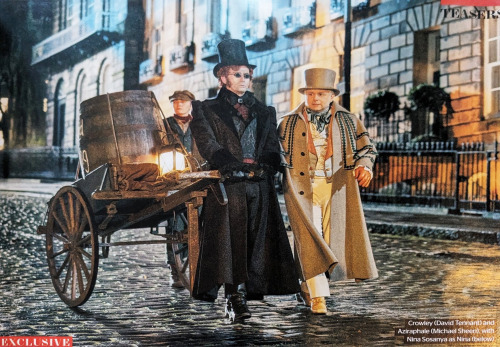
Now, we know that despite not showing it very often, Crowley has always been very fond of the humans and never really put himself on a pedestal simply because he's an immortal being himself. He likes humans, just like Aziraphale does. But, just like this story will tell us, Crowley knows that on top of liking humans, you can't just put them into boxes of good and evil and expect them to always do what is supposedly the "right" or "divinely good" thing to do. (Which is what differentiates him from Aziraphale in the way he understands and treats them, as we're shown in this minisode).
Him immediately and unspokenly helping Elspeth with dragging the barrel therefore might also be a first sign of a tiny projection from present day Aziraphale, as opposed to what Crowley might have actually done (probably just walked beside her, like Aziraphale) because he has the knowledge that Crowley really was so very kind to her in the end, wasn't he? And that he's kind to humans in general. ("Not kind! Off my head on Laudanum!" Sure, babe.)
Most of this minisode, in my opinion, is actually there to establish how Aziraphale's view of morality and good vs. evil used to be quite flawed and elitist –– and how Crowley has always been there to gently nudge him towards questioning his black and white view of heavenly right and hellishly wrong. That's why I think there's not as many hints in this minisode about Aziraphale's memories not being an accurate portrayal of what happened, as there are in the Story of Job or the magic show in 1941. (And, fear not, the latter will definitely be the most hint-heavy one). Alas, there's still a few bits and bobs in the Story of wee Morag that stuck out to me, that make a brief yet good case of the whole unreliable narration thing.
First of all: The way Aziraphale describes all of it in his diary is so different from the way we see him actually remembering it. It's almost like he tried to write this entry (and possibly all of his diary) as a bit of a thrilling short story, with himself as the main character. Which makes sense, given the fact that he adores books and would certainly be keen on dabbling in the art of capital-w Writing himself. It's yet again hinting at the fact that sometimes people (and angels) try to polish and bedazzle stories (and memories) to make them seem more exciting and adventurous, often to distract from the not-so-fun parts of it.
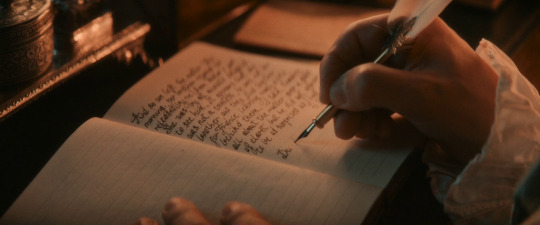
Like when Aziraphale's diary narrates:
"It was with heavy heart we arrived at Elspeth's destination. I was determined to thwart her monstrous plan!"
... and yet we see Crowley and Elspeth casually walking down the alleyway, very obviously not heavy-hearted in the slightest, while Aziraphale nervously scurries on behind them, very obviously not determined to thwart. (Timestamp-wise, it's around 17:38 in S2E3, in case you want to see for yourself.)
We get another cinematographic/auditory hint at the fact that Aziraphale's memory is heavily influenced by what he's feeling that very moment, when Dr. Mister Dalrymple –– FRCSE, thank you very much –– shows him the tumor he removed from the seven year old boy. You can see the shock and horror on Aziraphale's face once he learns of this child's cruel fate. We then proceed to hear Mr. Dalrymple's voice grow sort of echo-y and far away as the sad music swells up and drowns out his voice almost completely. It's awfully similar to what it feels like when really horrible news are broken to you and you dissociate and drift into a state of shock. Here's the clip of it, so you may listen for yourself:
It's clear that this is a very subjective portrayal of what Aziraphale is going through during this part of the memory. He's deeply horrified and saddened about the little boy having passed away so early in life – and we hear and feel this shock with him. Through him, because this is his memory. Whatever it is he's feeling and thinking, we're feeling and thinking it too because we're seeing it through his lense.
Another (less sad) hint at a possible exaggeration is the abnormally deep hole Crowley makes the two graveyard watch keepers fall into. I'm pretty sure he's very much in charge of his miracles, making this random slip-up seem a little silly – which is why I'm also pretty sure the "Might have slightly overdone it on that hole" is a wee bit of a meta hint at this just being another one of Aziraphale's dramatic bedazzlements of this story. For the *flings feather boa around neck* drama!
You know what else might be exaggerated? Hm, I dunno, maybe Crowley growing into the size of a tree for no apparent reason. Sure, yes, he's pretty high on Laudanum which is making him a bit loopy. But apart from that, it does seem an awfully big cinematographic euphemism for him being the metaphorical (and, once again, for the drama of it) literal bigger person in this scenario. He's the one who ends up saving Elspeth and who manages to secure a safe life without poverty and grave robbing for her. While Aziraphale was so tangled up in his own moral journey and main character-ism, missing that wee Morag was seconds away from death already, Crowley is the one who actually ends up growing stepping up for the human in need and saving them for good (pun intended).
In a way, it might just be Aziraphale's view of/feelings for Crowley in this very moment. Watching the demon outgrow what, according to Aziraphale's heavenly logic, is supposed to be a foul fiend, bestowing evil upon humanity – and growing into someone who does the exact opposite and saves Elspeth instead. Another larger-than-life character development, in Aziraphale's eyes. Literally.
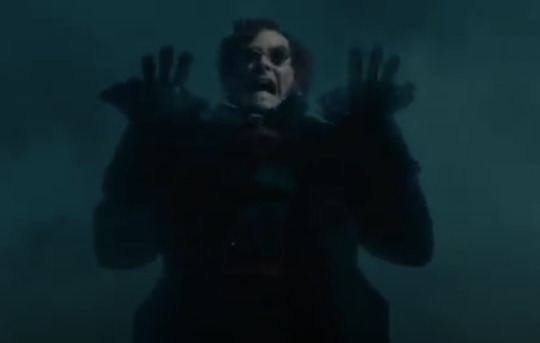
Let's switch back to the topic of the diary entry one last time, so I can make my final point of the this minisode's unreliable and a smidge over-dramatic narration of Dr. McFell. If you pay close attention, Aziraphale starts the entry we're all getting to experience with: "Last month, Crowley and I both happened to be in Edinburgh." Which means it didn't actually happen on the 10th of November, but rather at some point in October, 1827. Once we see Crowley get hydro-pumped back to Hell after rescuing Elspeth, the minisode ends with, presumably, the last sentence of Aziraphale's diary entry: "And that was the last I would see of Crowley for quite some time."
Take my hand and let's look at where the furniture isn't: This very clearly means that Crowley couldn't have been gone for more than a month, at best. Read again: "It happened last month and that was the last I would see of him for quite some time." This, albeit indirectly, clearly implies that when Aziraphale had sat down to write the diary entry, he had already run into Crowley again. Otherwise his phrasing would have probably been more along the lines of "... and I haven't seen Crowley since" or "... and Crowley has yet to return from wherever it is Hell's currently keeping him".
What's the point I'm trying to make? Good question. I guess my main point of storyteller Aziraphale being a bit over-dramatic in his narration is simply backed up by this, since A Single Month would barely pass as "quite some time" for an immortal being like him. And yet that's how he puts it, in his little Confidential Journals of A.Z. Fell, Vol. 603.
And another point that has absolutely nothing to do with the topic of this meta (but I'm still gonna make it 'cause this is my memory post): The meeting at St. Jame's Park in 1862 that so many, post-S2, took to be their first run-in after the Story of wee Morag, actually wasn't that at all. They saw each other at least once only a month later, as Aziraphale's diary lets us know. Which explains why he wasn't very surprised or concerned when he met Crowley in London, 1862. If there really had been 35 years in between those two events, the first one ending with Crowley being sucked back Downstairs to receive more than three decades worth of hellish punishment, wouldn't Aziraphale have been at least a tiny bit worried or more interested than:
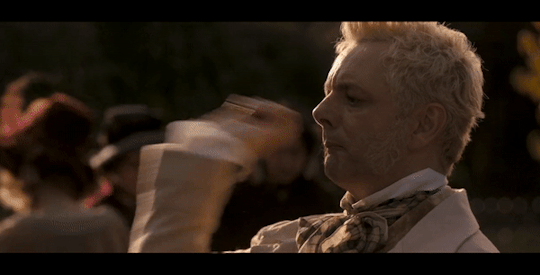
Just saying.
Alright, let's string this inflated hot air balloon of a post back together so we can outline some invisible furniture. This time with only two humble points:
Crowley through Aziraphale's lense
Backed up by how we are introduced to Bildad the Shuhite in the Job minisode (suave, cheeky, smart, passionate in shoemaking and obstetrics), it's growing quite clear that Aziraphale's memories and impressions of Crowley are very fond and impressed ones. He sees him as someone who's not only witty, funny and cool, but also as someone who has figured out way sooner and faster than him that nothing's ever black and white. Not God's plans and not the human's choices either.
Aziraphale as a bit of an exaggerating adventure author
With the direct parallel we get of inkslinger journalist!Aziraphale in the present day, it's quite apparent after this minisode that Aziraphale's memory is not only deeply influenced by his emotions, but that he also tends to have a bit of a dramatic touch to him. Although, you gotta give it to the guy: A month without seeing the love of your life, even if said life is eternal, can indeed seem like "quite some time".
Well, would you lookie here, we've reached the end of Part 2! What a journey it was. I hope you forgive me for the fact that I drifted off-course a few times. I just can't seem to reel in my silly little observations, even if they've got nothing to do with the point I'm trying to make. But hey, doesn't that just make me a little bit like Aziraphale's storytelling, in a way?
I'll let you be the judge of that.
See you in Part 3! And in case you haven't snuck a peak yet: here's Part 1 again.
Ta!
#good omens#good omens season 2#gos2#go2#good omens 2#good omens meta#ineffable husbands#aziraphale#crowley#good omens analysis#aziraphale is a storyteller#but not a very accurate one#story of wee morag#my own meta#aziraphale the Drama Queen#shakespeare who#unreliable but beloved story teller aziraphale
556 notes
·
View notes
Text
Both Pride & Prejudice and Much Ado About Nothing work so well as enemies to lovers because despite surface animosity, it's clear that both end couples really respect each other and for good reasons. I think you could even argue that with Beatrice, she spars with Benedick because she considers him a worthy opponent.
When Hero and Ursuala plot to make Beatrice fall in love, Hero instructs her to speak of Benedick and "praise him more than ever man did merit" and yet when Beatrice finally speaks, she doesn't disagree with their high praise, she says of Benedick:
For others say thou dost deserve, and I
Believe it better than reportingly.
Benedick likewise after his eavesdropping on Don Pedro, Leonato, and Claudio's praise Beatrice says:
They say the lady is fair; 'tis a
truth, I can bear them witness; and virtuous; 'tis
so, I cannot reprove it; and wise, but for loving
me; by my troth, it is no addition to her wit, nor
no great argument of her folly, for I will be
horribly in love with her.
Similarly in Pride & Prejudice, once the misunderstanding about Wickham is cleared away, Elizabeth is able to acknowledge to herself how much she respects and likes Darcy:
She began now to comprehend that he was exactly the man who, in disposition and talents, would most suit her. His understanding and temper, though unlike her own, would have answered all her wishes. It was an union that must have been to the advantage of both: by her ease and liveliness, his mind might have been softened, his manners improved; and from his judgment, information, and knowledge of the world, she must have received benefit of greater importance.
Darcy also finds that he admires Elizabeth, after initially dismissing her:
But no sooner had he made it clear to himself and his friends that she had hardly a good feature in her face, than he began to find it was rendered uncommonly intelligent by the beautiful expression of her dark eyes. To this discovery succeeded some others equally mortifying. Though he had detected with a critical eye more than one failure of perfect symmetry in her form, he was forced to acknowledge her figure to be light and pleasing; and in spite of his asserting that her manners were not those of the fashionable world, he was caught by their easy playfulness.
All of these characters also hear and accept criticism of themselves. Both Benedick and Beatrice hear they are too proud to accept love, which they both overcome. Elizabeth learns that she judged Darcy without sufficient information and Darcy that his behaviour was not that of a gentleman. Their mutual acceptance of this criticism and their growth as people leads to their ultimate happiness.
Unfortunately, those who reproduce this trope often forget to build this foundation of respect and the acknowledgement, either personally or publically, that the characters have been wrong. Instead we get characters who mid argument begin ripping each other's clothes off. No growth, no understanding how they have been wrong, it just becomes "thin line between hatred and love" instead of "we grew towards each other".
#enemies to lovers done right#enemies to lovers trope#trope analysis#pride and prejudice#much ado about nothing#much ado about nothing day#growing towards each other#obviously the character growth is almost instant in Much Ado#but that's just a time factor#a lot more room in a novel#shakespeare#benedick#beatrice#elizabeth bennet#mr. darcy#fitzwilliam darcy
852 notes
·
View notes
Text
"But there is something particular about Cleopatra and the imaginative escape she offers for white performers. She presents a fantasy of a stately queen with an erotic power that white actresses can inhabit and take pleasure in without facing any of the difficulties faced by Black women. Like white European colonial settlers, they occupy her character though only briefly. And this is nothing new. In the seventeenth century, one aristocratic woman had her portrait painted as Cleopatra—a performative act in which it was possible to pretend to be the kind of woman she could never actually be within the chaste and virtuous bounds of Renaissance white womanhood. The sitter is identified as Lady Anne Clifford. A Jacobean lady in Egyptian regalia, according to seventeenth-century orientalist notion of national costume, holds an asp above her breast, iconically invoking Cleopatra. For a long time, it seems, white women have stepped into the fantasy of the dark queen.
It seems odd that Antony and Cleopatra was not always viewed as one of Shakespeare's race plays. That is changing, finally. If theatre directors continue to centralise whiteness in their readings of the play, however, it in many ways replicates Caesar's triumph over Egypt. We relive Cleopatra's defeat every time we watch a white woman play her—due respect to Dames Judi Dench, Helen Mirren, Harriet Walter, and Eve Best. But we begin to see more clearly the Egyptian Queen's own prophetic vision as she chose to end her life on her own terms. She imagined herself being performed for years to come by actors who do not resemble her in any way—and that is, for the most part, what has happened."
—Dr. Farah Karim-Cooper, The Great White Bard: How to Love Shakespeare While Talking About Race (emphasis mine)
#max.txt#antony and cleopatra#i am reading this book so so slowly due to the Life but i recommend it!#i honestly wish dr. karim-cooper was a little harder on shakespeare. but the analysis is really good regardless
182 notes
·
View notes
Text
not to continue to bring up hamlet in the context of dorian gray but the parallels are soooo good i mean come on
dorian - hamlet: self-centered, unhealthily fixated on life, death, youth and how all things we hold dear die the quickest, bad at being nice to women
basil - horatio: gay, in love with the titular character, watching the person he lives for devolve into madness and pain without being able to help
sybil vane and her family - ophelia, laertes, polonius: literally their scenes together in the beginning before jim goes to australia are perfect parallels for laertes’ talking to ophelia before he goes to france. like, INSANELY similar. and then when sybil dies…
i also think it’s interesting that, of all the plays sybil performs in, she never plays ophelia. i could be wrong, but im like 80% sure that dorian never mentions her in hamlet.
lord henry is an interesting case because you could read him as rosencrantz/guildenstern, given his friendship with both basil and dorian, and i don’t disagree with that reading at all. but he sews the first seeds of doubt in dorian, he’s the reason dorian starts to freak out about the impermanence of youth. to me, he functions as the ghost. i mean, think of it:
basil/horatio meets henry/the ghost in the first scene, dorian/hamlet comes along and basil/horatio BEGS for him to be careful because he doesn’t want his best friend to suffer corruption. henry/ghost and dorian/hamlet have a private conversation which alters the latter’s outlook and mental state, and when he returns, he isn’t the same.
i’m so,,, i’m so normal about this.
also sybil’s suicide/not suicide. AGHHHHHHH
#shakespeare#hamlet#william shakespeare#the picture of dorian gray#oscar wilde#dorian gray#hamratio#romeo and juliet#classic literature#classic lit memes#literary analysis
224 notes
·
View notes
Text
still thinking about that 2005 David Tennant Romeo & Juliet essay...
#and not much else#completely normal about it#if anyone hasn't read it go read it stat#he's completely insane#and he GETS it#david tennant#romeo and juliet#shakespeare#shakespeare plays#analysis#literature#dark academia#shakespeare analysis#honestly even if you don't give a shit about tennant read it cause it's genuinely really interesting
8 notes
·
View notes
Text
Not my usual content but just wanted to say with the Ballad of Songbirds and Snakes hype right now (I’m so excited) I’ve been surprised by how many people I’ve seen saying they didn’t realise that Snow’s first name was Coriolanus because they thought it was Cornelius, I don’t know where that’s come from but it means you’re missing out on the symbolism of his name!! And I love the symbolism of his name so I wanted to talk about it.
“Coriolanus” is the title and main character of a Shakespeare okay based in the life of legendary Roman hero Gnaeus Marcius Coriolanus. I want to be clear this is not a play I have personally studied so I’m not an expert! But the play is about politics and particularly the power that language can have in politics, and anything Coriolanus lacks in language ability he makes up for with violence. He has attachments to only feminine figures in his small family despite being presented as a stereotypically masculine figure himself, and his ultimate tragic flaw is his pride and arrogance. It is possibly notable that in the play Coriolanus is a high-born noble of Rome whilst Snow struggles for livelihood in the Capital, but I think it’s really important that his situation never led him to feel empathy for anyone else, particularly in the districts, the way it did Tigris.
“Coriolanus also explores the questions of what makes someone a hero, and whether or not one can be both a hero and a real human”
It is a while since I’ve read the books but I think there are very clear parallels to draw from the key themes of the Shakespeare play and the character arc of Suzanne Collins’ character, and I find that really interesting.
However, as I said, I have not studied Coriolanus myself so if anyone has and has anything to add or dispute please do so, I would love to hear more I’m genuinely very interested
#hunger games#the hunger games#coriolanus snow#lucy gray baird#ballad of songbirds and snakes#ballad of songbirds and snakes trailer#the ballad of songbirds and snakes#catching fire#mockingjay#district 12#Coriolanus#bosbas#shakespeare#book analysis#dystopian books#dystopian
239 notes
·
View notes
Text
Trying super hard not to obsess over the deliberate choice of having Oliver be dressed in a costume that has very heavy themes of Puck/Robin Goodfellow AND King Oberon for his birthday party while Felix has cheap golden wings strapped to his back in an outfit that just SCREAMS Titania (despite his mother being implicitly dressed as such-) in the way it symbolises Titania's refusal to reconcile or reunite with Oberon throughout the plot of A Midsummer Night's Dream, as well as her disdain for Puck and his tricks, which is further supported by Felix's own choices to make his costume the bare minimum for an event celebrating Oliver and his refusal to forgive or forget Oliver's lies.
A theme/symbolism which is only further emphasised with Felix doing the best he can to avoid him at all costs and Oliver refusing to let him do so for his own selfish needs and wants-
#foxglovevibes#saltburn spoilers#saltburn#felix catton#oliver quick#shakespeare#shakespearean#titania#oberon#puck#robin goodfellow#costume analysis#character analysis
150 notes
·
View notes
Text
'Hamlet was friends with Ophelia' this. 'Hamlet was friends with Laertes' that. Consider:
Hamlet was friends with Polonius.
Hear me out:
1: Both theatre kids. Enough said.
2: Apart from Horatio, Polonius is the character most capable of sustaining conversations with Hamlet. He takes Hamlet's insults in stride. He has not just one, but multiple extended conversations with Hamlet. Hamlet displays aggravation towards Gertrude and Claudius, while Polonius displays aggravation towards Laertes and Ophelia...but the two seem strangely calm, almost exasperated, around each other. Granted, the origins of Polonius's attitude is probably because he is socially inferior to Hamlet and because he wants to appeal to Hamlet to reveal 'secrets'...but Hamlet definitely appreciates a conversation partner that can endure him, if not keep up with him, and why wouldn't Polonius return that sentiment?
3: They also both speak numerous asides. It shows that they have a shared tendency to comment on people behind their backs (which is corroborated by other aspects of the play, of course), and this indicates that there is a nonzero chance that they have gossiped together.
4: Ophelia approached Polonius about Hamlet's madness. Consider:
-Ophelia seems to be distressed and concerned about Hamlet when she approaches Polonius.
-Ophelia knows that Polonius is overprotective, yet still approached Polonius about Hamlet, expressing her concern (as in Hamlet looking 'piteous', 'as if he had been loosed out of Hell') specifically.
The implication here is that Ophelia appears to believe that Polonius won't try to actively harm Hamlet, but might rather help him, or at least prevent Hamlet from getting worse. And why would Polonius want to help Hamlet? You know the drill.
5: We get a lot of ambiguity about Hamlet's madness throughout the play. However, we mostly agree that sending R&G, unwitting coconspirators in a murder plot, to die in his place, was a move no sane person would do. We can also agree that at least some of Hamlet's 'madness' early on was feigned.
Consider that the death of Polonius was what drove Hamlet truly mad. It matches up with the timeline that Hamlet started being truly mad just before the R&G death-sentence while being at least somewhat sane earlier.
And why would killing Polonius drive Hamlet over the edge? Apart from the general shock of murder, finding out you accidentally killed a long-time friend would definitely be enough to drive anyone over the edge.
6. They both like surveillance. One more shared hobby.
7. As I've outlined in my Polonius and Gertrude are foils post, Polonius appears to be too concerned as a parent while Gertrude appears to be too unconcerned, and Hamlet is greatly dissatisfied with Gertrude's attitude. By extension, then, Hamlet would probably respect Polonius's "engagement" better compared to Gertrude's "detachment", and this might draw them together.
8. Speaking about Gertrude! Hamlet and Polonius are the only two characters in the play who have expressed explicit, strong dissent in-person against Gertrude specifically. Combining with point 3, ranting about Gertrude could have been an excellent bonding activity for them.
Of course, I like this headcanon because it makes the story more tragic. But I have an additional reason:
-Were Hamlet once friends with Polonius, Hamlet's killing of Polonius would be a betrayal of that friendship. This adds an additional layer of meaning when Laertes talks about 'honour' in the final scene.
And finally, all this also indicates that Hamlet and Polonius are foils (differences despite similarity). I am too tired to analyse this further but. Yeah I think we get the gist.
#I identify with Polo and my greatest frenemy identifies with Hamlet. So there is definitely a lot of projection here#hopefully my claim still makes sense when I write out my analysis#shakespeare#hamlet#polonius#shakespeare analysis#hamlet analysis#headcanon#also since they're both theatre kids and they both speak a lot of asides.#My conspiracy theory is that they are the only two characters in the play who are self-aware of their genre#except that the last thing they expected was for *each other* to become the catalyst of the tragic plot.#yes my brainrot is festerrrrrrring
24 notes
·
View notes
Text

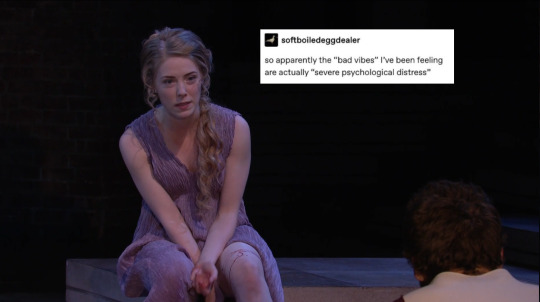
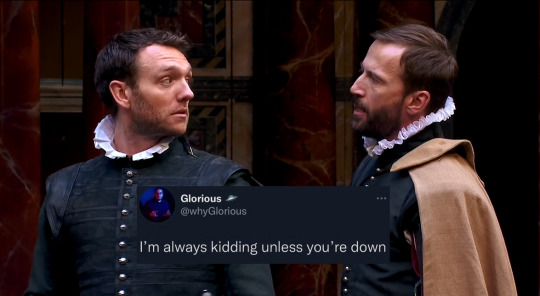
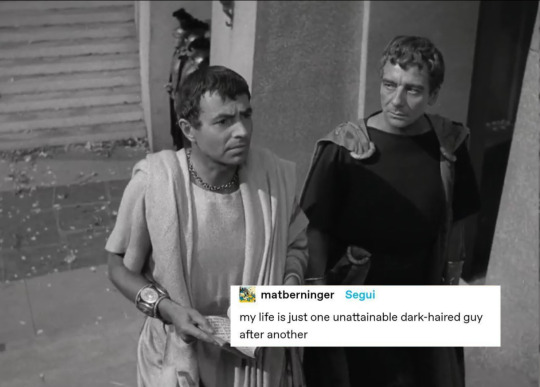
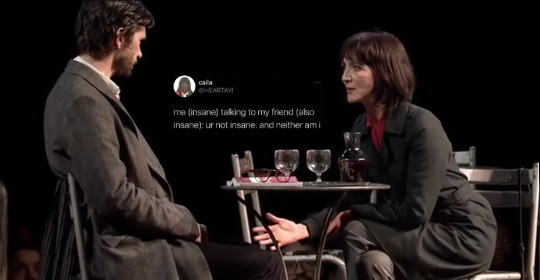


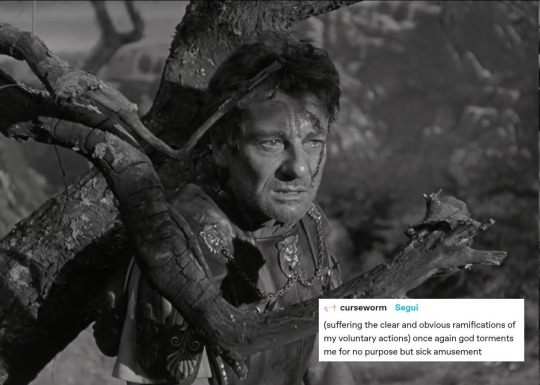
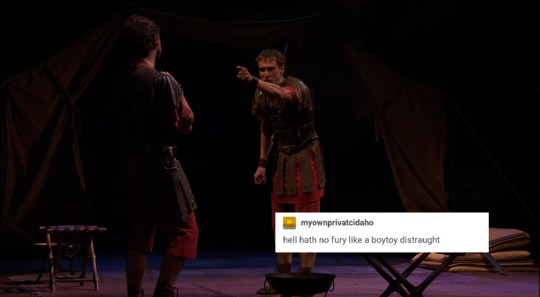
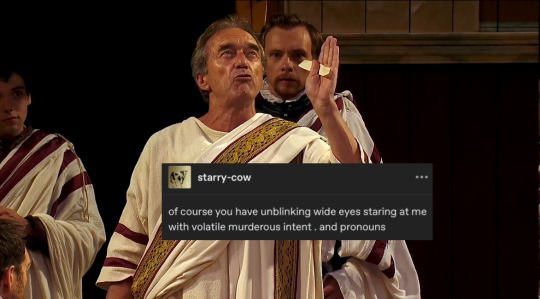

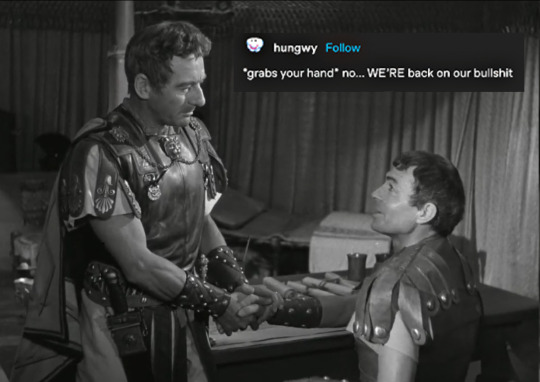

julius caesar + textposts
#listen i enjoy thorough media analysis but first and foremost i am a tumblr user#julius caesar#shakespeare#happy ides of march guys
143 notes
·
View notes
Text
Some Julius Caesar x The Danton Case Parallels to Celebrate the Ides of March, Frev Style 🔪🥳
Firstly, both Przybyszewska’s Danton Case and Shakespeare’s Julius Caesar are obviously (excellent!) tragedies that are set in a dying republic on the brink of collapse.
Here are some other interesting parallels I was able to trace:
1. Brutus and Robespierre:
Both of them are driven to execute an important figure even though they initially do not want to do it. They are both conflicted but feel like they have no other choice and have to commit the violent act for the good of the republic.
They are also arguably quite alike in terms of character: you have the „noble Brutus“ and then Robespierre, who is consistently referred to as „the Incorruptible“. Both are seen by others as selfless and committed to the good of the state (the people in the crowd very much emphasise this fact in both of the plays, I do have the receipts)
There is even the scene in which Brutus chastises Cassius for taking bribes, which plays into the idea of him as being (literally) “incorruptible” as well. And vice versa, traces of Brutus’ famed stoicism can then certainly be found in Maximilien.
2. Cassius and Saint-Just:
Both are characters who convince the protagonists (Brutus/Robespierre) to go along the violent act while not necessarily being portrayed as antagonists (at least Saint-Just definitely can't be seen as one in Przybyszewska’s play).
There are also parallels in the close relationship between Brutus and Cassius and Robespierre and Saint-Just, where they are very much portrayed as each other’s closest confidants. Of course, this idea can easily be pushed even further if one wishes to read between the lines. (There is no Camille Desmoulins in Shakespeare though)
3. Manipulating the Crowd:
I'm perhaps the most fascinated by how both Brutus and Mark Antony as well as Robespierre and Danton have the necessary rhetorical skills to manipulate the crowd of commoners (Robespierre being able to “play the crowd like an organ” very much came to my mind when I was reading Act 3 Scene 2 of the Shakespeare’s play).
Both Shakespeare and Przybyszewska portray “the court of public opinion” and how it can easily be manipulated - how opinions can be changed in the matter of minutes - in a way that is genuinely fascinating.
Specifically, the similarity between A3S2 in which people first listen to Brutus only to be immediately swayed by Mark Antony’s speech shortly after and the scene in the court in which Danton manipulates the crowd were in fact so similar in some respects that it was borderline uncanny.
The problem arises when looking for a mirror to Danton’s character in Shakespeare’s play.
4. The Case for Danton x Caesar:
It is Caesar who gets killed for being perceived as a danger to the republic
Both Caesar and Danton are portrayed as being very much beloved by the common people
Also, the idea of Danton being immortal is expressed at the end of Przybyszewka’s play, and while he does not come back literally as a ghost like Ceasar does, Robespierre nonetheless explains to Saint-Just that Danton’s spirit never truly dies.
5. The Case for Danton x Mark Antony:
If we see Danton and Robespierre as foils, Mark Antony makes more sense as a parallel to Danton (even though he does not die), since both Robespierre and Brutus as the classic ascetic/stoic archetype while Danton and Mark Antony’s are well-known for their appetite for drinking, women (or, you know, people, in the case of Mark Antony) , and the pleasures of life overall.
Both are also severely underestimated by their enemies at first, yet they prove to be quite cunning and are able to use their words skilfully to win over the public
Overall, reading both of the plays – especially the parts about manipulating the Roman public and the citizens of Paris just with the power of words – really makes me wonder if Przybyszewska read Shakespeare’s play and used it as a source of inspiration. It would make sense, especially given how the parallel between the French Republic and the Roman Republic was well-established long before her time (even, somewhat tragically, by the revolutionaries themselves).
I promise I think about Przybyszewska's and Shakespeare’s play and the Roman Republic along with the French Revolution a totally normal amount of time & that it definitely does not consume my every waking thought that should be very much going towards the exam preparation.
#ides of march#julius caesar#brutus#french revolution#maximilien robespierre#the danton case#stanisława przybyszewska#william shakespeare#mark antony#literature#classic literature#english literature#literary analysis#(attempted)#marcus junius brutus#georges jacques danton#antoine de saint-just#saint just#robespierre#frev#frev community#history#renaissance#tagamemnon#classics#roman republic#ancient rome#classic studies#you can tell this was not AI generated by the fact that it is so chaotic and at times barely coherent#but there is heart in it okay
53 notes
·
View notes
Text
So I went on a YouTube binge yesterday watching people talk about classic literature and I remembered Hamlet which I read for school like 5 or 6 years ago and I kinda didn’t get it but the internet (especially tumblr) seem to go buckwild for Hamlet and I’d like to understand
So please explain tumblr, why do people love Hamlet? (either the play or character is fine)
#I don’t mean this in a condescending way at all I promise#I like didn’t really get literature analysis until I graduated high school ngl :/#I’m a science math nerd tbh#I’m better at it now#I think just having real world experiences and being free to think for myself really helped me with that#hamlet#william shakespeare#shakespeare#Ophelia#Claudius#polonius#classic literature#classic lit#literature#theatre#plays#play#please reblog#the lion king
74 notes
·
View notes